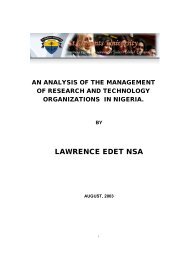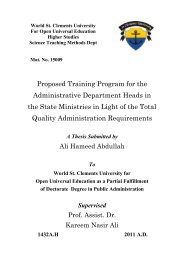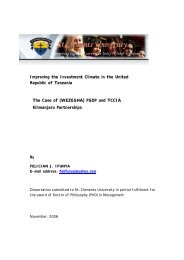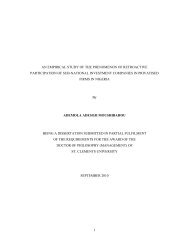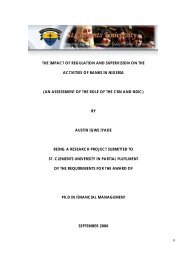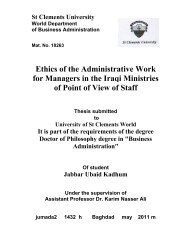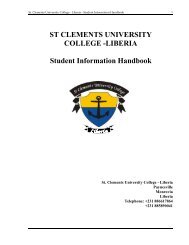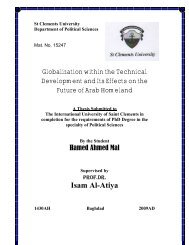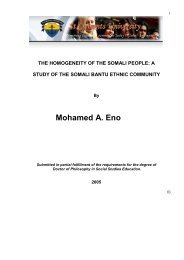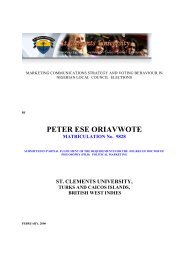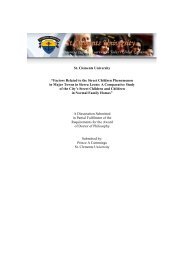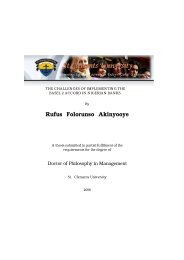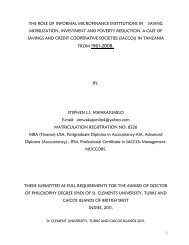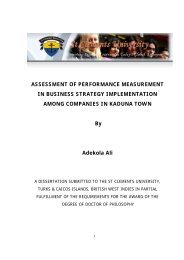CHURCH AWARENESS AND PRACTICE OF TOTAL QUALITY ...
CHURCH AWARENESS AND PRACTICE OF TOTAL QUALITY ...
CHURCH AWARENESS AND PRACTICE OF TOTAL QUALITY ...
Create successful ePaper yourself
Turn your PDF publications into a flip-book with our unique Google optimized e-Paper software.
of trust an employee develops with an organization will determine his level of<br />
dependence and performance.<br />
2.1:12 Organizational Climate: This is understood as enduring characteristics of the<br />
organization that is reflected in the attitudes and descriptions employees make of the<br />
policies, practices and conditions that exist in the work environment (Schneider et al,<br />
1975). Further, Schwartz et al (1981, P31) see climate “as a measure of whether people’s<br />
expectations about what it should be like to work in an organization are being met.”<br />
Schein, 1985 said that climate can most accurately be understood as a manifestation of<br />
culture. Although Reichers et al, 1990 said culture is typically defined as a deeper, less<br />
consciously held set of meanings. Accordingly, measure of climate shows whether beliefs<br />
and expectations are being fulfilled, and may also offer valuable insights to whether and<br />
how an organization’s culture will accommodate change.<br />
Schwartz et al 1981, whose findings are applicable to TQM, said they found that a<br />
climate incompatible with the intended change can offer a strong level of resistance and<br />
even derail the most well planned change process. Positive climate is a strong factor for<br />
successful TQM implementation. Over the years, TQM has been globally embraced<br />
because of its theoretical promises. But outcome has not met expectations in some cases.<br />
Sadgrove (1995, P22) said “70% of all attempts fail.<br />
A Gallup survey in the USA found that only 28% of firms had achieved significant<br />
results from their quality initiatives (where “significant” meant increasing profit or<br />
market share).” Erickson, 1992; Fuchsberg, 1992 and Kendrick, 1993 were quoted as<br />
saying (in an article on the internet) that “recent evidence suggests that attempts to<br />
implement it are often unsuccessful.”<br />
Wyatt, a human resources consulting firm, surveyed 531 companies that had undergone<br />
restructuring in 1992. Only 41% of the 361 companies that started TQM programmes as a<br />
part of restructuring considered them to have been effective (Fuchsberg, 1993).<br />
Similarly, (Doyle, 1992) reported that a study by McKinsey and co, revealed that of<br />
TQM programmes in place for more than two years, as many as two thirds are considered<br />
failures by the employees.<br />
The question is this, what is making them fail? Some researchers listed below have<br />
attributed the high rate of failure to certain implementation deficiencies such as<br />
organizational commitment, reward system, shared vision, empowerment, etc - Brown et<br />
al, 1994; Danjin et al, 1992; Doyle, 1992; Emery et al, 1992 & Gilbert, 1993). Several<br />
other studies done by Bright et al, 1993, Glover, 1993, Morris, 1994 and Westbrook,<br />
1993 indicated that failure might be due to organizational inability to adopt a TQM- type<br />
culture; that is, a culture based on “living for the customer.”<br />
In a Tucows Inc. internet service recent publication, a research firm did a work to test the<br />
significance of “Climate” as a necessary precondition for TQM successful



